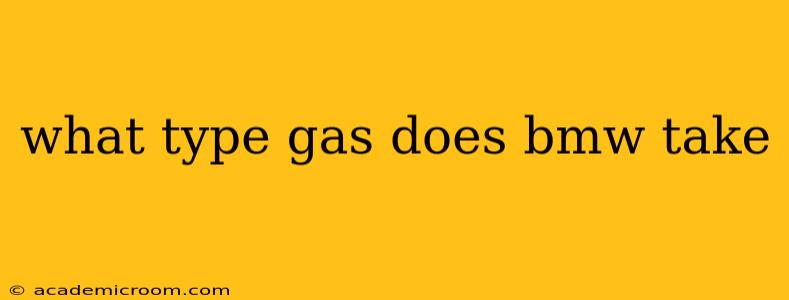What Type of Gas Does a BMW Take? Fueling Your Bavarian Machine
BMWs, known for their performance and luxury, don't all use the same type of gas. The specific fuel recommendation depends on the model year and engine type. While many newer BMWs can handle premium unleaded gasoline, understanding the nuances is crucial for optimal engine performance and longevity.
This guide will clarify the fuel requirements for your BMW and address common questions surrounding gasoline choices.
What octane rating should I use in my BMW?
The most common recommendation for BMWs is premium unleaded gasoline (91 octane or higher). However, this is not universally true. Your owner's manual is the definitive source of information. Check the sticker inside the fuel filler door or consult your owner's manual for the exact octane rating recommended for your specific BMW model. Using a lower octane fuel than recommended can lead to knocking (detonation), reduced performance, and potential engine damage.
Using higher octane fuel than recommended is generally safe, but it won't provide any noticeable performance gains and is unnecessary fuel expense.
Can I use regular unleaded gas in my BMW?
While some older BMW models might tolerate regular unleaded gasoline (87 octane) without immediate damage, it's strongly discouraged. Modern BMW engines are designed to run optimally on premium fuel. Using regular gas consistently will likely lead to decreased performance, reduced fuel efficiency, and potential long-term engine problems. The engine's sophisticated control systems are calibrated for premium fuel, and using a lower grade could negatively affect their operation.
What happens if I use the wrong type of gas in my BMW?
Using the incorrect fuel type, particularly using regular unleaded in a car designed for premium, can result in several issues:
- Engine knocking or pinging: This is a harsh metallic sound indicating pre-ignition, where the fuel-air mixture ignites before the spark plug fires, putting stress on the engine.
- Reduced fuel efficiency: The engine may not burn the fuel as efficiently, leading to poorer gas mileage.
- Reduced performance: You might experience a loss of power and responsiveness.
- Long-term engine damage: Consistent use of incorrect fuel can cause significant damage to internal engine components, leading to costly repairs.
My BMW's fuel filler cap says "premium fuel only." What does this mean?
This is a clear indication that your vehicle requires premium unleaded gasoline. Ignoring this recommendation could void your warranty and potentially lead to significant engine problems. Always adhere to the manufacturer's specifications.
Where can I find the recommended fuel type for my BMW?
The best place to find the recommended fuel type is:
- Your owner's manual: This is the most reliable source of information.
- The sticker inside the fuel filler door: Many BMWs have a sticker clearly stating the recommended fuel type and octane rating.
Failing these methods, contacting your local BMW dealership or consulting their official website can provide clarification.
Is there a difference between premium gas brands?
While different premium gasoline brands might contain slightly different additives, the octane rating remains the key factor for your BMW. Choosing a reputable brand is generally recommended, but the impact on engine performance will likely be minimal compared to using the correct octane rating.
By paying close attention to your BMW's fuel requirements and consistently using the recommended premium unleaded gasoline, you'll ensure optimal performance, longevity, and protect your investment. Always refer to your owner's manual for the most accurate and up-to-date information.
